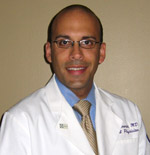Online System Tracks Surgical Complications
 |
| Dr. Karl Bilimoria |
An online reporting system designed by Karl Y. Bilimoria, MD, MS and colleagues at the Feinberg School of Medicine helped clinicians track surgical complications and detect patterns of adverse events. The results of a two-year trial appeared in the April issue of the Archives of Surgery.
Complications and deaths during surgery discussed at weekly surgical morbidity and mortality (M&M) conferences usually focus on individual cases rather than overall hospital systems. The Northwestern Online Surgical Quality Improvement (NOSQI) system was designed to capture adverse event patterns that can be addressed and corrected.
NOSQI has three modules for reporting: one enables residents to input their weekly M&M reports; the second enables anonymous reports of “near misses”—an event that could have led to an adverse outcome but was corrected; and the third, the surgery quality management module, is used to enter data from all cases reviewed by the Department of Surgery’s quality management committee. The system’s adverse event pattern recognition software uses highly categorized classification of complications to facilitate queries and provide automated notification of adverse event patterns.
From September 2005 through August 2007, 15,524 surgical patients were reported, including 957 (6.2 percent) adverse events and 34 (0.2 percent) anonymous reports. “The automated pattern recognition system helped identify four event patterns from M&M reports and three patterns from anonymous/near-miss reporting,” said Dr. Bilimoria. These patterns were addressed with educational initiatives, correction of systems issues and/or intensive quality monitoring.
The events entered into the online system also were compared with hospital databases to assess the completeness of reporting. Only 27.2 percent (264 of 970) of readmissions and 41.6 percent (89 of 214) of inpatient deaths were reported into the system; no change occurred in monthly adverse reporting rate when the online system was initiated. “Though not surprising, this under-reporting was disappointing,” said Dr. Bilimoria. Interventions to increase reporting continue to be explored.
“An electronic physician-reported event tracking system should be incorporated into all surgery departments irrespective of whether the department is associated with a residency program; however, this is just one component of what should be a larger quality improvement effort,” said Dr. Bilimoria. “An online event tracking system is a feasible, promising and potentially powerful initiative to improve surgical safety in the U.S.”
Dr. Bilimoria, a general surgery resident at the Feinberg School and a research fellow at the American College of Surgeons, focuses his research on health care quality and patient safety. For example, one study published last fall in the Journal of the National Cancer Institute (JNCI) showed that nearly 60 percent of the 1,300 U.S. hospitals evaluated failed to implement evidence-based guidelines for lymph node evaluation of colorectal cancers. One paper in the April 10 online issue of the Journal of Clinical Oncology (JCO) showed that sentinel lymph node biopsy (a beneficial procedure for patients with intermediate stage melanomas) is underused in the U.S. in certain socioeconomic subgroups. Another report in JCO online April 13 showed that some women whose breast cancer has spread minimally to a lymph node do not always need all their lymph nodes removed. Two additional upcoming JNCI and JCO articles describe how to improve care for pancreatic cancer and melanoma. This work emphasizes the need to implement consistent, evidence-based staging of patients to achieve the highest quality of care.






